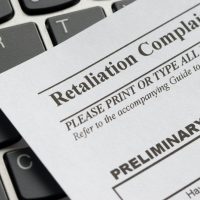Can Employers Retaliate Against Employees Who Testify In Employment Discrimination Lawsuits?

For the past two decades, our Citrus County, Florida retaliatory discharge attorneys have represented workers who have been retaliated against for exercising their employee rights. Through their decades of experience representing workplace retaliation victims, our Inverness, Florida retaliatory discharge lawyers know that a common employment law myth is that employees who testify in employment discrimination lawsuits are not protected from retaliation. Because of this employment law myth, employees are often reluctant to testify as witnesses in employment discrimination lawsuits. Indeed, as the U.S. Supreme Court recognized in Crawford v. Metropolitan Gov. of Nashville & Davidson County, 555 U.S. 217 (2009), “fear of retaliation is the leading reason why people stay silent instead of voicing their concerns about bias and discrimination.” In this article, our Citrus County, Florida retaliatory discharge attorneys explain how the recent decision in Race v. Delta Airlines, Inc., Case No. 18-cv-094 (E.D. Ky. Jan. 21, 2022) illustrates that federal employment discrimination law prohibits employers from retaliating against employees who testify as witnesses in employment discrimination lawsuits.
Employee Protection From Retaliation
The federal employment discrimination laws contain broad protection against retaliation. The federal employment discrimination laws protect employees from retaliation when they oppose an unlawful employment discriminatory practice. For example, employees are protected from retaliation when they make an internal complaint of workplace discrimination or file a workplace discrimination complaint with the U.S. Equal Employment Opportunity Commission (EEOC). The federal employment discrimination laws also protect employees from retaliation when they participate in an investigation or proceeding alleging workplace discrimination. For example, employees are protected from retaliation when they participate in an EEOC investigation into alleged workplace discrimination, file a lawsuit alleging workplace discrimination, or testify as a witness in a lawsuit alleging workplace discrimination.
Retaliatory Discharge Lawsuit
In Race, a woman named Race brought a retaliation case against her former employer, Delta Airlines, Inc. (Delta), pursuant to Title VII of the Civil Rights Act of 1964 (Title VII). Race contends that she was subjected to a final corrective action notice in retaliation for testifying as a witness in a race discrimination lawsuit brought by Delta employees pursuant to Title VII. Race was employed by Delta as a Ready-Reserve employee. In this position, Race worked part-time and received unlimited employee fight privileges, including “companion” passes which are issued only to domestic partners. These travel privileges are considered the biggest benefits of the Ready-Reserve position.
Since 2011, Race has been in a romantic relationship with a former Delta employee named Freeman. In 2015, Freeman and five other Delta employees filed a lawsuit, Freeman v. Delta Air Lines, Inc., pursuant to Title VII alleging that Delta discriminated against them on the basis of race. Delta took Race’s deposition during the Freemanrace discrimination litigation. During her deposition in October 2016, Race testified that she and Freeman had been in an “off and on” relationship for a couple of years and that they owned separate houses.
Delta claims that after Race’s deposition, it determined that the requirements for Freeman to hold privileges as Race’s domestic partner were not met, so it placed Race on a final corrective action notice effective December 17, 2016. According to Race, no one at Delta had questioned her about her alleged violation of Delta’s domestic partnership pass travel policy before this time. As part of the disciplinary action, Freeman was removed from Race’s travel benefits, Race’s own flight privileges were suspended for two years, and Race was made ineligible for two years for raise, transfer, or promotion. Delta did not restore Race’s flight privileges until December 2018.
Employee Protected From Retaliation
Delta filed a motion with the trial court seeking dismissal of Race’s retaliation claim. At the outset of its opinion denying Delta’s motion for dismissal, the trial court explained that Title VII protected Race from retaliation for testifying in a race discrimination lawsuit brought under Title VII. Having determined that Race was protected from retaliation for her deposition testimony, the trial court concluded that “a jury could find that Delta disciplined Race as a direct means of retaliating against her for testifying in the Freeman case.” In support of its conclusion, the trial court pointed out that Race was subjected to the final corrective action less than two months after she completed her deposition in October 2016. The close timing between Race’s deposition testimony and the final correction action notice was sufficient, the trial court reasoned, to establish a causal connection between the two events. The trial court also observed that Delta did not begin an alleged investigation into Race’s alleged violation of Delta’s domestic partnership pass travel policy “until Race gave two days of depositions testimony in support of the Freeman plaintiffs.” The trial court also pointed out that Delta used Race’s deposition “to elicit information about her relationship with Freeman, which was not even relevant to the claims in the Freeman matter.” “Then,” the trial court explained, “less than two months after the deposition, Delta disciplined Race, stripping her of her valued flight privileges for two years and rendering her ineligible for raises, promotions, or transfers.” “A reasonable jury could conclude from this,” the trial court determined, that Delta “used Race’s deposition as an opportunity to lay a foundation to take an adverse action against her.”
Inverness, FL Retaliatory Discharge Lawyers
Based in Ocala, Florida, and representing workers throughout Florida, our retaliatory discharge lawyers in Citrus County, Florida have fought for the rights of retaliatory discharge victims for more than twenty years. If you have been the victim of workplace retaliation or have questions about your protection against retaliation under the federal employment discrimination laws, please contact our office for a free consultation with our retaliatory discharge lawyers in Citrus County, Florida. Our employee rights law firm takes retaliatory discharge cases on a contingency fee basis. This means that there are no attorney’s fees incurred unless there is a recovery and our attorney’s fees come solely from the monetary award that you recover.